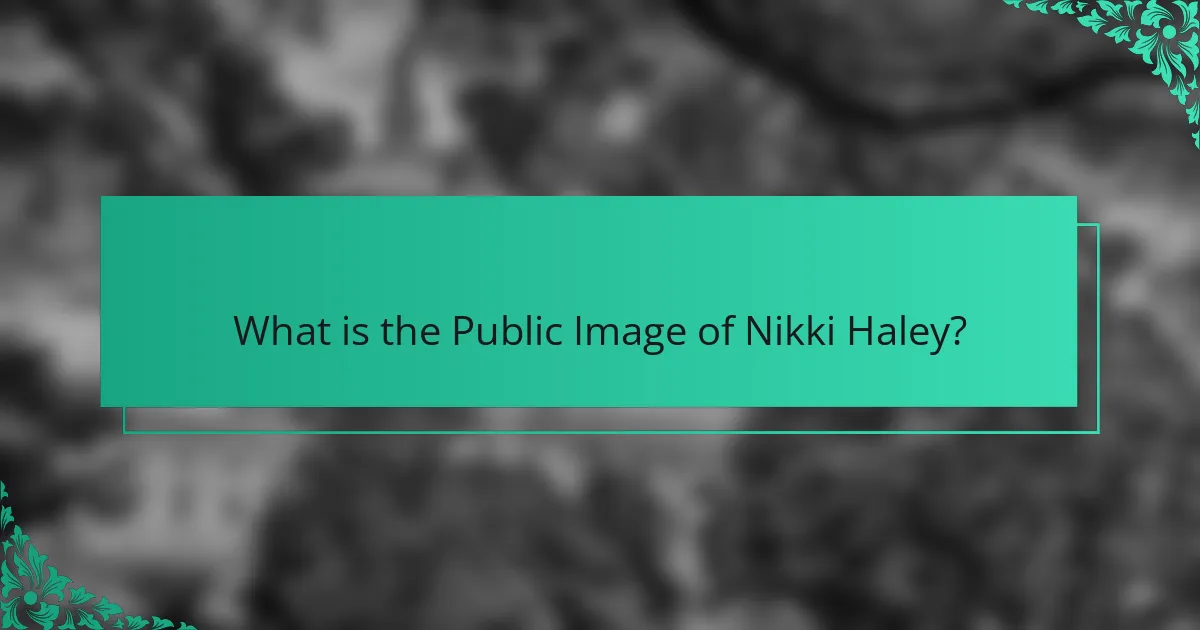Nikki Haley is a prominent political figure recognized for her strong public image and extensive diplomatic experience as the former U.S. Ambassador to the United Nations. The article examines her effective communication skills on international issues and her positioning as a moderate Republican focused on national security. It highlights her foreign policy stances, particularly concerning China and Russia, and notes the mixed public perception she receives, with fluctuating approval ratings influenced by her political engagements and media presence. The discussion also addresses the criticisms she faces from certain conservative groups, providing a comprehensive overview of her complex public persona and its impact on various voter demographics.

What is the Public Image of Nikki Haley?
Nikki Haley’s public image is that of a strong and assertive political figure. She is known for her diplomatic experience as the former U.S. Ambassador to the United Nations. Haley has been recognized for her ability to communicate effectively on international issues. Public perception often highlights her as a moderate Republican with a focus on national security. She has received praise for her stances on foreign policy, particularly regarding China and Russia. However, her image is also met with criticism from some conservative factions. Polls indicate that her approval ratings fluctuate based on her political engagements and media appearances. Overall, she maintains a complex public persona that resonates differently with various voter demographics.
How has Nikki Haley’s diplomatic experience shaped her public image?
Nikki Haley’s diplomatic experience has significantly shaped her public image as a competent and assertive leader. Serving as the U.S. Ambassador to the United Nations from 2017 to 2018, she gained international recognition. Her ability to navigate complex global issues enhanced her credibility. Haley’s outspoken stance on human rights and national security issues resonated with many voters. She often emphasized American strength and leadership on the world stage. This approach helped cultivate an image of decisiveness and authority. Additionally, her diplomatic skills contributed to her perception as a unifying figure within the Republican Party. Public opinion polls have reflected increased favorability ratings during her tenure at the UN. Overall, her diplomatic background has positioned her as a formidable candidate in the political arena.
What key roles has Nikki Haley held that contribute to her diplomatic experience?
Nikki Haley has held several key roles that contribute to her diplomatic experience. She served as the United States Ambassador to the United Nations from 2017 to 2018. In this position, she represented the U.S. in international discussions and negotiations. Haley was also the Governor of South Carolina from 2011 to 2017. As governor, she dealt with various issues that required diplomatic skills, including disaster response and economic development. Additionally, she has been involved in foreign policy discussions and initiatives throughout her political career. These roles have provided her with significant exposure to international relations and diplomacy.
How do her accomplishments in these roles influence public perception?
Nikki Haley’s accomplishments in her roles significantly shape public perception. Her tenure as U.S. Ambassador to the United Nations showcased her diplomatic skills. She effectively advocated for U.S. interests on the global stage. This strengthened her image as a competent leader. As Governor of South Carolina, she managed crises, including the Charleston [censured] shooting. Her response garnered respect and admiration from constituents. Public approval ratings during her governorship reflected this positive perception. Overall, her achievements contribute to an image of resilience and effectiveness in leadership.
What media strategies has Nikki Haley employed to craft her public image?
Nikki Haley has employed various media strategies to craft her public image. She utilizes social media platforms effectively to engage with her audience. Haley shares personal stories and insights that resonate with her supporters. She often emphasizes her background as a former governor and UN ambassador. This highlights her experience and leadership qualities. Haley participates in interviews and public speaking engagements to further enhance her visibility. She strategically addresses key issues that appeal to her target demographic. Her media strategies aim to create a relatable and strong public persona. These approaches have contributed to her recognition as a significant political figure.
Which platforms does Nikki Haley utilize for her media presence?
Nikki Haley utilizes various platforms for her media presence. She is active on Twitter, where she shares updates and engages with followers. Haley also uses Facebook to connect with a broader audience. Instagram serves as another platform for her to share personal insights and campaign visuals. Additionally, she participates in interviews on major news networks to reach a wider audience. Haley’s presence on these platforms helps shape her public image and communicate her political messages effectively.
How effective are her communication strategies in shaping public opinion?
Nikki Haley’s communication strategies are highly effective in shaping public opinion. She employs clear messaging and relatable narratives. Her use of social media amplifies her reach significantly. According to a study by Pew Research Center, 69% of Americans use social media for news. Haley’s ability to engage audiences through platforms like Twitter enhances her visibility. Additionally, her background in diplomacy allows her to communicate complex issues simply. This approach resonates with various demographics. Polling data shows a positive shift in public perception following her media appearances. Overall, her strategies effectively influence public opinion and enhance her image.
What factors contribute to the public reception of Nikki Haley?
Nikki Haley’s public reception is influenced by her diplomatic experience, media strategy, and political positions. Her tenure as U.S. Ambassador to the United Nations showcased her ability to engage on global issues. This experience lends her credibility among voters who value foreign policy expertise. Additionally, Haley’s media strategy includes effective use of social media platforms to connect with constituents. Her communication style often emphasizes relatability and approachability, which can enhance public perception. Furthermore, her political positions, particularly on key issues like immigration and foreign relations, resonate with specific voter demographics. The combination of these factors shapes how the public views her as a political figure.
How do public opinion polls reflect Nikki Haley’s popularity?
Public opinion polls indicate Nikki Haley’s popularity by measuring voter sentiment. These polls often show her approval ratings among different demographics. For instance, recent surveys may reveal her standing among Republican voters compared to her opponents. In some polls, Haley has been shown to have favorable ratings, indicating strong support. Conversely, lower ratings in other polls can suggest challenges in her appeal. The data from these polls can fluctuate based on current events and her media presence. Additionally, polls can reflect shifts in public perception following debates or policy announcements. Overall, public opinion polls serve as a snapshot of Nikki Haley’s popularity at a given time.
What role does social media play in shaping her public reception?
Social media significantly influences Nikki Haley’s public reception. It allows her to communicate directly with constituents and supporters. Platforms like Twitter and Facebook enable her to share her views instantly. This direct engagement can enhance her relatability and approachability. Additionally, social media serves as a space for real-time feedback from the public. Positive interactions can bolster her image, while negative comments can lead to public relations challenges. The use of social media also allows her to control her narrative more effectively. Research shows that candidates who actively engage on social media tend to have stronger public support. This highlights the critical role social media plays in shaping perceptions of political figures like Haley.
How do Nikki Haley’s diplomatic experiences and media strategies intersect?
Nikki Haley’s diplomatic experiences and media strategies intersect through her ability to communicate effectively on global issues. As the former U.S. Ambassador to the United Nations, Haley navigated complex international relations. This role required her to articulate U.S. policies clearly and persuasively. Her media strategies often leverage her diplomatic background to enhance credibility. For instance, she uses social media to share insights from her diplomatic engagements. This approach helps her connect with a broader audience. Additionally, Haley’s public speaking skills, honed during her diplomatic tenure, are showcased in media appearances. This intersection allows her to maintain a strong public image as a knowledgeable and approachable leader.
What are the implications of Nikki Haley’s public image for her political future?
Nikki Haley’s public image significantly influences her political future. A strong public image can enhance her electability. Haley’s diplomatic experience as a former UN ambassador bolsters her credibility. Positive media coverage has increased her visibility among voters. Her ability to connect with diverse audiences may attract broader support. Conversely, negative perceptions can hinder her political aspirations. For instance, past controversies have affected her approval ratings. Maintaining a favorable public image will be crucial as she navigates future campaigns. Ultimately, her public image will play a pivotal role in shaping her political trajectory.
What lessons can be learned from Nikki Haley’s approach to public image management?
Nikki Haley’s approach to public image management emphasizes authenticity and strategic communication. She effectively uses personal narratives to connect with audiences. Haley’s background as a minority female leader adds a unique perspective to her image. She balances assertiveness with approachability, appealing to diverse voter bases. Her media strategy includes engaging directly with constituents through social media. This builds a sense of relatability and transparency. Haley’s experience in diplomacy enhances her credibility, showcasing her as a knowledgeable leader. These elements collectively demonstrate the importance of a coherent and resonant public image strategy.
What best practices can be derived from her media strategy?
Best practices derived from Nikki Haley’s media strategy include consistent messaging, audience engagement, and adaptability. Consistent messaging helps maintain a clear and recognizable public image. Audience engagement fosters a connection with supporters, enhancing loyalty and trust. Adaptability allows for responsiveness to changing news cycles and public sentiment. These practices are evident in her effective use of social media platforms to communicate directly with constituents. Additionally, her strategic timing in addressing key issues demonstrates an understanding of media dynamics. Collectively, these practices contribute to a strong and resilient public image.
How can political figures effectively manage their public image in today’s media landscape?
Political figures can effectively manage their public image by leveraging social media platforms strategically. They should engage with their audience directly through posts, videos, and live interactions. Consistent messaging is crucial; political figures must align their public statements with their core values. Transparency in communication builds trust, especially when addressing controversies or criticisms.
Regularly monitoring media coverage allows political figures to respond promptly to misinformation. Utilizing data analytics helps in understanding audience sentiment and tailoring content accordingly. Collaborating with influential figures can enhance credibility and broaden reach.
A study by Pew Research Center shows that 69% of adults in the U.S. use social media, making it an essential tool for image management. Engaging in community events and public forums further humanizes political figures, fostering relatability and connection with constituents.
The main entity of the article is Nikki Haley, a prominent political figure known for her diplomatic experience and media strategies. The article provides an overview of Haley’s public image, shaped by her roles as the former U.S. Ambassador to the United Nations and Governor of South Carolina, highlighting her effectiveness in foreign policy and communication. It examines how her media strategies, particularly on social platforms, influence public perception and approval ratings. Additionally, the article discusses the implications of her public image for her political future and offers insights into best practices for managing public image in the contemporary media landscape.
